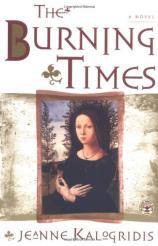Reading Group Guide
Discussion Questions
The Burning Times: A Novel of Medieval France

1. Michel says of Sybille, "Heretic or no, there was much that was good in her; and even if there were not, she deserved, as did all God's children, the opportunity to come to know Him before her death." Did you believe Michel wanted to convert Sybille to Christianity? How does Michel's experience with Sybille challenge and change Michel's faith throughout the story?
2. Discuss how the book differentiates between religion and morality. The characters identify themselves either as Christians or members of the Race. Which rituals and beliefs exhibited by the each group are common to world religions? Which traits most distinguished the Christians from the Knights of the Race? How did your own religious beliefs affect your reaction to the book?
3. At what point did you suspect that Michel's role in the story went far beyond that of a mere scribe? When he was visited by Luc's dreams? Or earlier, when he first sensed Sybille's essential compassion and saintliness? What did you guess about his involvement before it was revealed to you?
4. Put yourself in Michel's position when Sybille reveals his true identity. Would you believe her declaration? Or would you distrust her on the basis of the teachings of your superiors? What events or details leading up to her revelation would play a role in your reaction?
5. Of the story's many twists and turns, which did you enjoy most? Which plot twist came as the greatest surprise? Why didn't you see it coming?
6. What is the ultimate lesson Sybille learns from her extraordinary trials? Is the lesson religious in nature, or does it transcend spiritual definition? If so, how? How does she put this lesson into practice, and how does it help her achieve her goals?
7. Many of the book's central characters are misunderstood or mistreated women who nevertheless battle against forces of injustice. Do you see Sybille and her grandmother as forerunners of modern feminists? When female characters did seize power, how did they go about it? Besides women, what other groups were targeted by the Inquisition, and why?
8. Do Luc and Sybille remind you of any notable historical or mythical couples? If so, which ones, and in what ways? Which aspects of their relationship are unique and unprecedented? What do you think will become of Sybille and Luc, now that they are reunited? Considering their combined resolve and powers, what complications or challenges might test them in the future?
9. Which of the secondary characters did you find most intriguing? Which would you be interested in learning more about? Invite each group member to choose a character of particular interest. Share conjecture about what that character's day-to-day life may have been like.
10. Kalogridis is unsparing in her descriptions of the pain and injury characters suffer in the course of their adventures. How did the stark realism of these descriptions affect you? Did they aid your understanding of what was at stake for the characters? Would the book have been less successful if Kalogridis spared us this vivid suffering? If so, how?
11. The Burning Times could be categorized as a mystery, a fantasy, and a work of literary fiction. Did it evoke those genres equally in your mind? If not, on which level was it most successful? If you were shelving books at a local store, in which section would you put The Burning Times?
12. Recreating fourteenth-century Europe for current-day readers is a painstaking enterprise. Which details were most effective in evoking the book's setting? How much did you know about this time period before you read the novel? Did this affect your perception of it in any way? What events and customs of our times will seem strangest a thousand years from now? What details might future authors focus on to convincingly evoke our own culture?
The Burning Times: A Novel of Medieval France
- Publication Date: February 26, 2002
- Genres: Fiction
- Paperback: 400 pages
- Publisher: Scribner
- ISBN-10: 0684869241
- ISBN-13: 9780684869247







